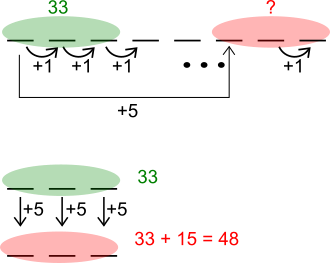Luis' Eight
Problem
Luis writes down eight consecutive positive integers.
The sum of the three smallest numbers is $33$.
What is the sum of the three largest numbers?
If you liked this problem, here is an NRICH task which challenges you to use similar mathematical ideas.
Student Solutions
Answer: $48$
Using symbols
Luis' numbers: $n$, $n+1$, $n+2$, $n+3$, $n+4$, $n+5$, $n+6$ and $n+7$
The sum of the three smallest numbers: $n+(n+1)+(n+2) = 3n+3$
The sum of the three largest numbers: $(n+5)+(n+6)+(n+7) = 3n+18$
Three smallest numbers add up to $33$ so $3n+3 = 33$
$3n+18 = (3n+ 3) + 15 = 33+15 = 48$
Alternatively method using symbols:
Luis' numbers: $n$, $n+1$, $n+2$, $n+3$, $n+4$, $n+5$, $n+6$ and $n+7$
The sum of the three smallest numbers: $n+(n+1)+(n+2) = 3n+3$
Three smallest numbers add up to $33$, so $3n+3 = 33$, so $n = 10$
So Luis' numbers are: $10$, $11$, $12$, $13$, $14$, $15$, $16$ and $17$
The sum of the three largest numbers: $15+16+17 = 48$
Thinking about patterns in the numbers:
